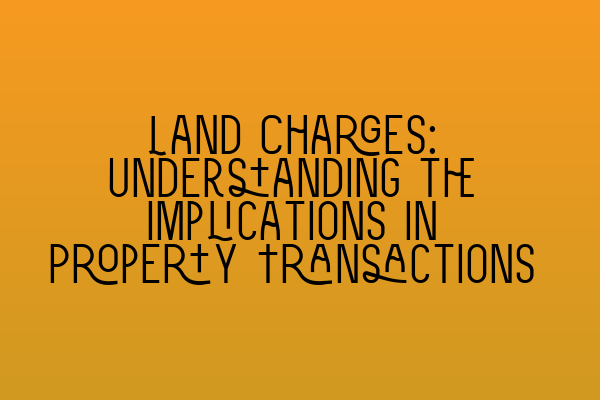Land Charges: Understanding the Implications in Property Transactions
When it comes to property transactions, one crucial aspect that both buyers and sellers need to be aware of is land charges. Land charges are legal obligations or restrictions that affect the title of a property, and they can have significant implications on the transaction process. In this blog post, we will delve into the details of land charges, how they can affect property transactions, and the steps you can take to navigate through them smoothly.
Before we dive deeper, it’s important to note that land charges fall under the jurisdiction of land law. As a solicitor specializing in property law, SQE Property Law & Land Law can provide expert advice and assistance throughout the entire transaction process.
Types of Land Charges
There are various types of land charges, each with its own implications and requirements. It’s essential to understand these charges to ensure a smooth and successful property transaction. Here are some of the most common types of land charges:
1. Covenants: Covenants are legal agreements that impose obligations on the owner of a property. These obligations can affect how the property is used or what activities can be carried out on the land. For example, a covenant might prohibit the construction of additional structures or require the maintenance of shared access roads.
2. Easements: An easement is a right granted for one party to use another party’s land for a specific purpose. Common examples of easements include rights of way, rights to access utilities, or rights to light.
3. Mortgages: A mortgage is a type of land charge where a lender has a legal interest in the property as security for a loan. The presence of a mortgage on a property can have implications for both buyers and sellers, as it may directly affect the transfer of ownership.
4. Liens: A lien is a legal claim on a property to secure the payment of a debt or the performance of an obligation. Liens can arise from various sources such as unpaid taxes or unpaid bills from contractors or suppliers.
Implications in Property Transactions
Understanding land charges is crucial for both buyers and sellers in property transactions. Buyers need to be aware of any charges affecting the property they are interested in, as these charges may limit its use or affect its value. Sellers, on the other hand, must disclose all relevant land charges to potential buyers to ensure a transparent and legal transaction.
During the due diligence process, buyers should conduct thorough searches to uncover any land charges on the property. Searches can reveal details about existing covenants, easements, mortgages, and other potential charges that may affect the property’s future use or development. It is also essential to examine any financial implications associated with these charges, such as outstanding debts or financial obligations linked to the property.
Steps to Navigate Land Charges
To navigate land charges successfully, it is recommended to seek the guidance of a skilled property solicitor. SQE Property Law & Land Law can provide expert advice and assistance throughout the entire transaction process, from conducting searches to negotiating with the other party.
Here are some essential steps to navigate land charges:
1. Search: Conduct comprehensive searches to identify any existing land charges on the property. This may include examining Land Registry records, local council records, and conducting environmental searches.
2. Review: Carefully review the details and implications of any identified land charges. Assess how these charges might affect the intended use or value of the property.
3. Negotiate: If any significant land charges are discovered, consider negotiating with the other party or seek legal advice to find a resolution that satisfies all parties involved.
4. Documentation: Ensure that all land charges are appropriately documented within the legal framework of the transaction. This may involve drafting contracts, adding relevant clauses, or seeking permits or licenses where necessary.
5. Compliance: It is crucial to comply with any obligations associated with land charges, such as obtaining necessary permissions or adhering to maintenance agreements. Failure to comply with these obligations can have legal consequences and compromise the success of the transaction.
Conclusion
Land charges play a vital role in property transactions, and understanding their implications is fundamental for both buyers and sellers. By conducting thorough searches, reviewing the details, seeking legal advice when needed, and complying with obligations, you can navigate through land charges smoothly and ensure a successful transaction.
SQE Property Law & Land Law is here to provide expert assistance in handling land charges and all aspects of property law. Contact us today, and let us guide you through your property transaction journey.
Related Articles:
– SQE 1 Practice Exam Questions
– SQE 1 Practice Mocks FLK1 FLK2
– SQE 2 Preparation Courses
– SQE 1 Preparation Courses
– SRA SQE Exam Dates
